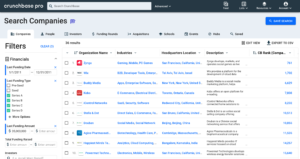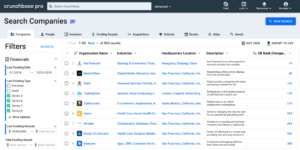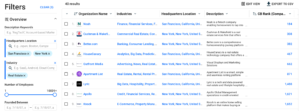If you’re reading this you may be telling yourself, “I need a new career.” So what should you do if you want to work at a tech company, but feel like you don’t have the right experience to break in? In short, you should target specific tech companies whose mission aligns with what you’ve accomplished in the past.
I discovered this lesson accidentally in my own career transition- where an enormous risk I took in my career inadvertently led me to my dream job at Dropbox.
Back in 2011…
My first job out of college was at a real estate private equity fund in San Francisco. It was a good job to start a career in real estate finance, but for whatever reason, I just wasn’t happy in that role.
I felt guilty for feeling unhappy. The voice in my head kept telling me I was lucky to have a job at all (especially given the 2008 recession). But I felt unfulfilled, a little sad, and very apprehensive that this was what the next 40 years of my working life were going to feel like.
At the time, I lived with three friends from college, all of whom were a little more contrarian than I was at the time. Each of them worked for startups. I was immediately struck by how much fun they had at work, and how much energy they come home with at night.
Seeing an opportunity
When I asked what tech startups were like, they shared why they loved working in the startup culture. They were solving challenges that affected millions of users. They were solving problems that they cared about, and they all had fun together doing it. Most importantly, it seemed like it was ok for them to be themselves at the office, which at the time, blew me away, and made me wish for the same thing.
Just to set the context, remember that this was 2011. Joining a startup was considered insanely risky, it was unclear what would happen to your career if you failed, and it was even unclear what success could even look like. Beyond that, there weren’t a ton of startups hiring, and the roles that were open required a specific background. At the time, I wanted to break into tech, but it seemed like a one in a million shot to actually do it.
8 years later, the landscape for tech jobs has shifted dramatically.
Fast forward 8 years, and remarkably, the tech landscape looks incredibly different. Just to show you how much the tech landscape has changed, let’s look at funding statistics in the year 2011, vs. the year 2018:

We ran an analysis of all funding rounds over $35M in 2011, using the criteria above (courtesy of Crunchbase Pro)
When you add together all the funding events that match these criteria, you see that $12 billion dollars were invested in 2011, over 152 funding rounds- the equivalent of 120,000 jobs.

Then, we ran the exact same analysis for 2018 (courtesy of Crunchbase Pro)
When you add together all the funding events that match these criteria (968 of these rounds in total), you see that $288 BILLION DOLLARS have been invested in startups in 2018. That’s the equivalent of 2.8 million jobs, assuming an average compensation + employee expense of $100,000. On a comparative basis, that’s roughly 23x more tech jobs at venture-backed companies in 2018 than back in 2011. Which is insane.
Simply put, the demand for tech talent has never been higher, and the opportunity to break into tech has never been more readily available.
How do you use this paradigm shift to your advantage?
One major impact of this paradigm shift is the diversity of available roles. With hundreds of billions of dollars of investment flowing into the tech sector, the diversity of company types is expanding rapidly.
No matter what background you’re coming from, there is very likely a tech company that aligns to your non-tech resume. This is incredibly important- developing an easily understandable career narrative is one of the biggest keys to breaking into tech. If you can find a tech company that aligns with what you’ve done in your academic or professional career, your value will be far more obvious to the hiring team than if you were to attempt to jump to a company with zero alignments to your background.
Explaining the why behind your career transition will become very logical and simple, and it won’t be hard to convince people why you’re passionate about solving the same sorts of problems that they are.
Examine your own resume, and connect the dots
If you’re a teacher and want to get into tech, the first logical place to look would be an EdTech company. If you’re a paralegal wanting to break into tech, that could mean applying to a law tech company. There isn’t a background out there that can’t be matched up with a tech company of some sort.
In my case, when I left my job in the real estate industry in 2011, there weren’t a ton of real estate tech startups hiring aggressively in San Francisco, if any. But I was incredibly curious about the tech world. I decided to take matters into my own hands to try to break into tech.
Dive into your experience
I created an iPhone app with my cousin (a software engineer). Our vision was to create a mobile bulletin board for groups to share photos privately. This was before Instagram had DM or group DM settings.
We felt like there was a need for people to share things privately with friends. Users wouldn’t need to worry about likes or other social pressures of sharing a photo with everyone you know.
We realized pretty quickly that the app didn’t have a future. However, in taking this risk, I had inadvertently ventured into the world of private file sharing. By random happenstance, my roommate at the time happened to work at Dropbox, and they were looking to grow their sales team. I had demonstrated a proven interest in file sharing technologies by attempting to build my own. Therefore my story and narrative made perfect sense in my interviews. I ended up getting a job that changed my life.
At the time, I was extremely lucky, because my actual background (real estate) didn’t align well with startup jobs. Meanwhile, an app I founded on a whim related to file sharing aligned directly with a company that was both hiring aggressively, and where I had an inside connection. In short, I got extremely lucky.
Without luck, here’s what I’d do today…
Nowadays, I wouldn’t need to rely on that type of luck. I’d be able to use that same real estate background to find, and apply to, a variety of real estate -focused startups, like Airbnb (Series A- 2010), WeWork (Series A- 2012), Opendoor (Series A- 2014), Envoy (Series A- 2015), Lyric (Series A- 2018), Bungalow (Series A- 2018) and so many more. You can use tools like Crunchbase to do a keyword search, and generate a list of incredible startups that match any criteria or background you can imagine.

Tools like Crunchbase Pro can help you find a company that’s a perfect fit for your background
Map out your personal pitch to break into the tech industry
Once you find companies to target, try to hone in on your personal pitch. Your personal pitch is an interviewing framework that I advise for an interview, regardless of role or industry. Your personal pitch consists of three elements. Explain why you’re a solid hire and the right person for the role. Then explain why you’re interested in the company.
Each of these items will tie to your backstory. Tie in what you’ve done in the past, and how that perspective makes you unique. In the case of someone with a real estate background like I had, applying to a role at a real estate-tech company (like a sales role at WeWork, for example) here’s how that might sound:
Why you?
I have worked in the real estate industry and understand it. I want to solve problems for a broader group of people than just a select group of institutional investors.
Why this company?
You’re passionate about solving the same sorts of problems that I am. Additionally, you’re doing it on a massive scale that impacts millions of people. WeWork makes it easy for companies to grow and expand offices organically. They help companies by not forcing them to commit to wasteful leases. You also make it easier for individuals in need of office space (as well as small startups) to feel connected to a community.
Why this sales role?
Achieving and setting ambitious goals motivate me. I’m drawn to the challenge of selling a product that hasn’t been sold before. WeWork’s sales cycle is a commercial real estate sale mixed with an enterprise software sale. I love that this type of sale hasn’t been done before.
Craft your resume to match the language of the role
Tailor your resume. People don’t do this enough- and if you’re changing industries, this becomes especially critical.
Let’s say you worked at a company where your title was slightly different from the title you’re applying for. However, you were doing the same tasks. Make sure you adjust your title so a recruiter can easily recognize a good fit.
When I applied for a job at Dropbox, my real estate title was “investment analyst.”
However, in practice, I managed various relationships with property managers. I ensured each signed leases that maintained the value of our properties. In startup speak, this would be known as an “account manager,” and would serve as a much better signal for recruiters and hiring managers that I had done similar things in the past.
If I could go back in time, I would have included the phrase “account manager” in my description of what my ‘investment analyst’ role actually was. That kind of alignment is incredibly important. It’s wise to assume a recruiter will spend about 5 seconds on your resume at the most. Recruiters scan for the keywords and phrases — make sure these phrases stand out and match their language!
Once you’re in the club, you stay in.
Once you get your first tech job and prove yourself as a valuable team member, the tech world is your oyster. The trick is to find your first job in tech. Most importantly, the key to doing that is to find roles and companies that align well with your non-tech background.
In 2019, I guarantee there is a startup that aligns to whatever your background looks like.
“I need a new career:” In summary…
- Don’t be afraid to apply for tech jobs even if you don’t have a tech background!
- Prepare a narrative and explain why you’re a great fit.
- Targeting companies, roles, and missions that align with what you’ve done in the past. This will help your narrative development process.
- Use search tools like Crunchbase to help you find the right company for you. Narrow your search based on the right keywords or specialty areas
About the author
Mike Marg is the founder of InterviewX, a freemium software product that makes it easy to prepare for interviews in the tech industry. Mike has worked at both Dropbox & Slack and now works as a sales leader at Clearbit in San Francisco.





